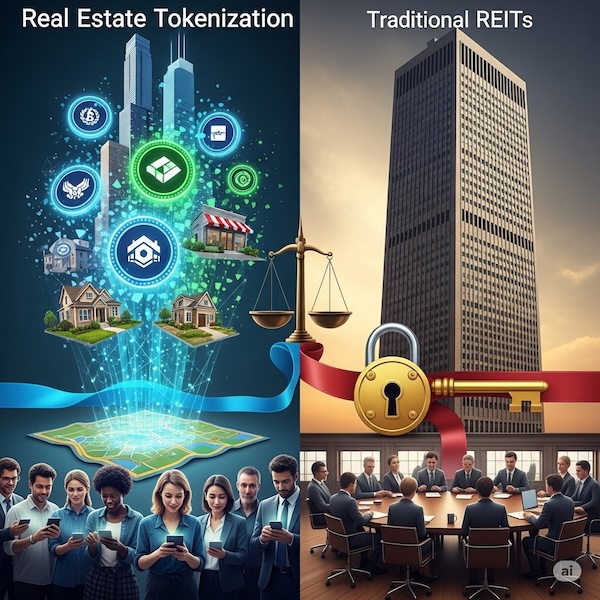Real Estate Investment Trusts (REITs) have been the primary vehicle for retail real estate investment for over 60 years, providing millions of investors with access to commercial real estate through publicly traded securities. Today, tokenized real estate is emerging as a new alternative that promises to address many of the limitations of traditional REITs while offering unique advantages. Understanding the differences between these approaches is crucial for investors considering their real estate allocation strategies.
Traditional REITs: The Established Model
REITs were created by Congress in 1960 to provide individual investors with access to large-scale, income-producing real estate. The REIT structure requires companies to:
- Distribute 90% of taxable income: REITs must pay out most of their income as dividends
- Invest primarily in real estate: At least 75% of assets must be in real estate
- Generate income from real estate: At least 75% of income must come from real estate sources
- Maintain broad ownership: No five shareholders can own more than 50% of shares
Advantages of Traditional REITs
- Liquidity: Publicly traded REITs can be bought and sold instantly
- Professional Management: Experienced management teams handle all operations
- Diversification: Large REITs own hundreds of properties across multiple markets
- Regulatory Oversight: SEC oversight and established regulatory framework
- Tax Efficiency: Pass-through taxation structure
Limitations of Traditional REITs
- Management Fees: Significant management and administrative fees
- Market Correlation: REIT prices often correlate with stock markets rather than real estate
- Limited Control: Investors have no say in property selection or management
- Forced Distributions: Required distributions may not align with optimal capital allocation
- Size Limitations: Focus on large, institutional-grade properties
Tokenized Real Estate: The New Alternative
Tokenized real estate uses blockchain technology to create digital securities that represent ownership in specific properties or portfolios of properties. This approach offers several structural differences from traditional REITs:
Direct Property Ownership
Unlike REITs, which are corporate entities that own properties, tokenized real estate can provide direct ownership in specific properties:
- Property-Specific Investment: Investors can choose specific properties to invest in
- Transparent Ownership: Clear connection between tokens and underlying assets
- Customized Structures: Flexible structures tailored to specific properties
Enhanced Transparency
Blockchain technology provides unprecedented transparency:
- Real-Time Reporting: Continuous monitoring of property performance
- Immutable Records: All transactions recorded on blockchain
- Automated Compliance: Smart contracts ensure compliance with investment terms
Comparative Analysis
Liquidity Comparison
Traditional REITs: Publicly traded REITs offer excellent liquidity through established stock exchanges, with millions of shares traded daily. However, this liquidity comes with the trade-off of stock market correlation.
Tokenized Real Estate: Secondary market liquidity is still developing but offers the potential for more direct real estate price correlation. Liquidity may be lower initially but could improve as markets mature.
Fee Structure Comparison
Traditional REITs: REITs typically charge management fees of 1-2% of assets, plus various other fees for acquisitions, dispositions, and financing. These fees can significantly impact returns over time.
Tokenized Real Estate: Platform fees are typically lower, often 0.5-1.5% annually, with more transparent fee structures. Smart contracts can automate many functions, reducing operational costs.
Investment Minimums
Traditional REITs: No minimum investment beyond the price of a single share, typically $10-200 per share.
Tokenized Real Estate: Minimums vary by platform and offering, typically ranging from $100 to $10,000, depending on the property and structure.
Diversification
Traditional REITs: Large REITs offer broad diversification across hundreds of properties, markets, and property types. However, investors cannot control this diversification.
Tokenized Real Estate: Investors can build customized portfolios by selecting specific properties, potentially achieving better diversification aligned with their preferences and risk tolerance.
Control and Governance
Traditional REITs: Shareholders have limited control over property selection, management decisions, or strategic direction. Voting rights are typically minimal for individual investors.
Tokenized Real Estate: Token holders may have more direct governance rights, including voting on major property decisions, management changes, or disposition strategies.
Risk Considerations
REIT-Specific Risks
- Interest Rate Sensitivity: REITs are sensitive to interest rate changes
- Market Correlation: REIT prices may not reflect underlying real estate values
- Management Risk: Dependence on management team performance
- Leverage Risk: Many REITs use significant leverage
Tokenized Real Estate Risks
- Technology Risk: Smart contract vulnerabilities and platform risks
- Regulatory Risk: Evolving regulatory framework
- Liquidity Risk: Secondary markets still developing
- Concentration Risk: Investment in specific properties rather than diversified portfolios
Tax Implications
REIT Taxation
REIT dividends are generally taxed as ordinary income, though some portion may qualify for the 20% deduction under Section 199A. Capital gains from REIT share sales are taxed at capital gains rates.
Tokenized Real Estate Taxation
Tax treatment depends on the specific structure but may offer advantages such as:
- Pass-Through Benefits: Potential for depreciation and other real estate tax benefits
- Capital Gains Treatment: Token appreciation may qualify for capital gains treatment
- 1031 Exchanges: Potential for like-kind exchanges in certain structures
Market Development and Future Outlook
REIT Market Maturity
The REIT market is mature and well-established, with over $3 trillion in assets globally. This maturity provides stability but may limit innovation and growth potential.
Tokenized Real Estate Growth
The tokenized real estate market is in early stages but growing rapidly. While this creates opportunities for early adopters, it also involves higher risks and uncertainty.
Investment Strategy Considerations
When REITs May Be Preferable
- Broad Diversification: When seeking broad real estate exposure
- Liquidity Priority: When immediate liquidity is essential
- Simplicity: When preferring established, simple investment structures
- Large Allocations: When making substantial real estate allocations
When Tokenized Real Estate May Be Preferable
- Property Selection: When wanting to choose specific properties
- Lower Fees: When fee minimization is a priority
- Innovation Exposure: When seeking exposure to innovative investment structures
- Direct Ownership: When preferring direct property ownership
Conclusion
Both traditional REITs and tokenized real estate offer valuable approaches to real estate investment, each with distinct advantages and limitations. REITs provide established, liquid access to diversified real estate portfolios with professional management, while tokenized real estate offers more direct ownership, lower fees, enhanced transparency, and innovative structures.
The choice between these approaches depends on individual investor preferences, risk tolerance, investment objectives, and beliefs about the future development of tokenized real estate markets. Many investors may find that a combination of both approaches provides optimal diversification and exposure to the evolving real estate investment landscape.
At RealPort, we believe that tokenized real estate represents the future of real estate investment, offering advantages that traditional REITs cannot match. However, we also recognize that REITs will continue to play an important role in many investors' portfolios. The key is understanding the trade-offs and choosing the approach that best aligns with your investment objectives and preferences.




